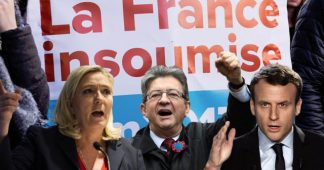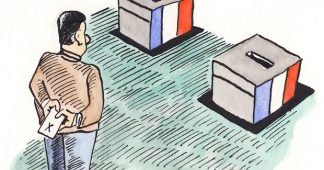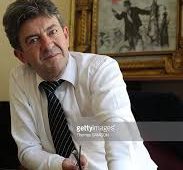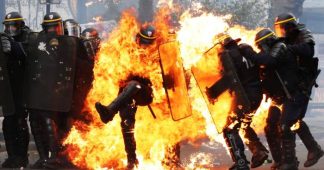by Dimitris Konstantakopoulos
Macron “scooped the pool and decamped” in the second round of the French presidential elections, scoring an easy victory over Marine Le Pen. Her performance was in any case so bad in the last week of the pre-election campaign that it led some commentators to the conclusion that the National Front did not want to be required to govern.
We have to wait and see if Macron consolidates his victory in the parliamentary elections also. But already both the Socialist Party and the Right, the two traditional parties of power in the country, project a picture of total disintegration and decay, with their cadres leaping into the water like rodents from a sinking ship and heading for the safety of Macron.
Consummating the humiliation of France’s political class, former “socialist” Prime Minister Manuel Valls pronounced the Socialist Party dead and affirmed his transposition to the party of Macron, for which he said he intended to be a parliamentary candidate. Only to receive the public answer from the party of his former Minister that he must submit his application through the Internet, following the procedures applicable for everyone. Finally they told him that his services are not required.
But even if in the parliamentary elections he achieves the institutional omnipotence that is his dream, Macron and his ideas remain isolated and espoused by a minority in French society, as indicated by analysis of the results of the first and second round of the presidential elections. The capture of the GS & M factory by its workers, who threaten to blow it up as these lines are being written, is a reminder that the tasks the new President has been set, or has set himself, will not be in any way easy.
A man of the “Markets” and of “Finance”
Nobody should have any doubts about the determination of this former Rothschild banker to carry out his mission, which is none other than to be the Margaret Thatcher of France. In any case, if he was chosen for this role, it is precisely because he has been trained for decades in the most absolute discipline and because he does not seem to have any particular emotional ties with his own country. It is not a professional politician but a man of “the markets” and of Finance who has come to govern France. If there is anyone who is determined to display as much harshness as is necessary and to take as many risks as are necessary, that person is Macron.
His hagiographers are now proliferating in the French press at the speed of mushrooms in the forest after rain. Many would like to liken him to Napoleon. Aware, though, that they would run the risk of being ridiculed, they confine themselves to reminders that since the Emperor the country has never had such a young ruler.
But this Napoleon does not plan to start any war with the monarchs of Europe, who linked themselves together, funded – it is said – by Rothschild, to strangle revolutionary France. His campaigns will be on the domestic front, like those of Thiers. Recall also that the Paris Commune emerged from the refusal of the people of France to accept their country’s capitulation to Germany.
Macron’s appearance, the day that he won the election, was flawless. Even his arrogance evidently served as a reminder to the French that he came from the class that is destined to govern. His speech was a series of generalities, which could have been delivered a century in the past or a century in the future. Except at one point: where he skewered via the terms “extremisms” the Left and the far Right, serving notice that his aim was war against them.
The only half-way human spontaneous element of M. Macron on his day of victory was at the end of celebrations, his embarrassed laugh when he was the only one in the group not to sing the Marseillaise. Either he did not know the words or he could not sing them.
If there is one song that the ruling class of France hates it is the country’s national anthem, summoning the citizenry “to arms”. And the same applies for the national rallying emblem “Liberté, égalité, fraternité.”
The banker-President has come to disencumber the country of all of this type of thing. His amazing success: entering politics and becoming President of France within three years, is a reflection of the massive power, influence and potential of finance capital, the Empire of Davos, in our era.
At the international level, Macron’s victory discontinues, at least temporarily, the string of successes of the most radical wing of the Western establishment which, persuaded that Fukuyama-type “benign globalization” is not making much progress, decided to place its bets on the “Huntington model” of the war of civilizations.
This is probably Finance Capital’s “Plan B”. But after the election of Trump and the Brexit there came the Dutch, and now the French, elections, to curb (temporarily?) its impetus.
Macron’s victory gives the EU a reprieve, staving off the likelihood of a sudden death, even though it would be a mistake for anyone to assume that its crisis has been overcome.
And how could it overcome it when the predominant political forces on the continent, Berlin and the Commission, persist with insouciance of a Marie Antoinette, in the same policies of administering to the patient the medicine that is killing him.
A minority president
The new president was elected by a minority of French voters in absolute terms and many who voted for him did not endorse his program but wanted to block Le Pen.
- In contrast to Chirac, who won 82% of the vote against Jean-Marie Le Pen in 2002, Macron obtained only 65%.
- For the first time since 1969 participation in the second round smaller (by 3%) than in the first.
- Τhe 12% figure for spoiled or blank ballots was an absolute record for the Fifth Republic (in 2012 it was 5.8%)
- 42% of those with the right to vote supported Macron and of those, according to public opinion polls, only 55% agreed with his ideas.
The results of the first round are genuinely representative of the political preferences of the French, half of whom voted for political forces opposed to the European Union in its present form.
If we factor in the votes for “La France Insoumise”, Mélenchon, the left-wing Socialist Hamon and the two Trotskyist candidates, we see that they account for 27% of the votes in the first round, slightly more than the proportion of votes that went to the far right and the anti-systemic Right Gaullists of Dupon-Aignan. Even if we do not count Hamon, we are still speaking of more than 50% “anti-systemic” votes, in a European country of central importance.
Hamon, remember, supported policies which, if implemented, would have led to clashes with Brussels. The reason that we include him in an intermediate category is that he was clearly unwilling to proceed to a break with the EU for the sake of imposing them.
In other words 50-55% of voters favor “antisystemic” parties, whether of the Left, the Right or the extreme Right.
55% was also the percentage of the French who voted against the draft European Constitutional Treaty (in essence the Maastricht structure) in the 2005 referendum. But at that time there were no political subjects in France to articulate this “No”. And the deep structural economic crisis of 2008 had not yet broken.
France became the second country in the EU, after Greece, where the majority of citizens voted for parties declaring themselves to be “antisystemic”. Confirming that we are in a situation of profound and intensifying structural, not cyclical, crisis of Western capitalism and its political system, of a depth, though not of an intensity, comparable to that of the 1929 crisis.
As occurred in the 1930s, the crisis tends to generate radical political subjects on the left and the far right, particularly in relatively stronger countries such as France, Britain and the United States, which can more easily imagine relying on their own forces. In weaker countries radicalization has manifested itself mainly on the Left, as with SYRIZA and PODEMOS.
A geopolitical Weimar
Not only are there significant structural similarities between the socio-political crisis of today’s Europe and that of the Weimar Republic (1919-33) in interwar Germany. Geopolitically today Europe is also reminiscent of the 1930s and early 1940s. By all indications it is under German hegemony, with only two countries at the opposite extremes challenging the desiderata of Berlin: Putin’s Russia to the east, obliged almost against its will to resist the West. And to the west Britain, whose ruling class dreams of a more powerful role for London, for the benefit always of the rising “Empire of Finance” and the USA.
Italy comes over as the perennial opportunist and vacillator, as in the time of Mussolini, prior to his final decision to side with Hitler. Poland reminds us in some ways of Pilsudski’s heyday. Spain seems to have withdrawn into its own peninsula, as it did then. A special case on the European periphery is Turkey, which is bargaining for its international position, not to mention another non-European country, which did not exist in the interwar period, Israel, but exerts massive influence over European, and even more so Mediterranean, developments.
Of course “German hegemony” over Europe always remains under the supervision of Finance, of the IMF, of the USA and NATO, which take care from time to time to remind Berlin of the limits of the permissible, and to impose them.
France has for some time positioned itself in a stance of submission and subordination to Germany, somewhat reminiscent – naturally with all due allowances for the very different conditions – of the Vichy regime of General Petain.
France is now, mutandis mutandis, in the position Germany was towards the victors of the First World War. This is why there is a potential for developing both a leftist radical and a far right answer, as happened with Germany in the intrawar period, when it vacillated between the Left and Hitler, ending with the Nazis, given the incompetence and betrayal of both German Social Democrats and Communists.
France, Germany and the EU
In Berlin signs of relief greeted the election of Macron in preference to Le Pen. They were soon followed, however, by warnings both from Germany and from the Brussels Commission to the newly elected President not to expect relaxation of “fiscal discipline”.
Macron has the support of the “International of Finance”, of which he is any case a representative. But despite the fact that Berlin allied itself with this “International” to impose its priorities on Europe, the German Right has no desire to expend the German surpluses on assisting its allies or the revival of the European and international economy, despite the fact that Mr. Gabriel (but not Mr. Schulz) and certain Green politicians are beginning to flirt with the idea, judging that the maintenance of German hegemony requires somewhat greater flexibility.
It remains to be seen what Macron is going to do, given that he must on the one hand confront a very real, albeit dissimulated, “civilized” German nationalism and on the other prepare to proceed with the demolition of labour law in his own country.
The resurrection of the Left
France is a country that has made ten revolutions in two centuries. From the Popular Front to the post-war predominance of the Communist Party, from the Trotskyists’ struggle for the Algerian Revolution up to May 1968 and the Socialist Party’s electoral victory in 1981, the Left has set its seal on the country’s history.
Many believed that this tradition has died, along with the distinction between Left and Right, with the total capitulation of the Socialist Party to neoliberalism, in conditions of progressive cultural decline and “Americanization”. The traditional socialist culture of the popular classes survived, but in a state of perennial defensiveness, without ideological-political representatives or a presence in the media. What remained of social revolt began to emigrate to the far right, the National Front of Marine Le Pen.
Until the underlying social demand for a true, authentic left met up with the political drive of Mélenchon and a miracle, a resurrection, occurred, a Left was born that has some connection with its name.
Mélenchon’s result in the first round must be seen as historic. It brings to a close the era of Socialist Party hegemony that opened with the Epinay congress in 1971, a development analogous to SYRIZA’s eclipse of PASOK.
There is nothing accidental about this result for Mélenchon. It reflects the enormous demand in all of the Western world for an authentic Left wing. A recent poll showed that 45% of American youth would vote socialist and 21% communist, although socialists and communists are almost non-existent in the US (or perhaps also because they are non-existent!). A few days ago a majority of British people opted in opinion polls for the Leftist electoral program of the Labour Party, which provides for renationalization of the railways, the Post Office and water, with corresponding measures to that effect.
It appears to have been pre-planned from the outset that the electoral game in France would go the way it went, with a match between Macron and Le Pen. Only against Le Pen was Macron assured of victory. Only against the Macron-Rothschild and deploying every dissident element in her arsenal could Le Pen have any hope of attaining credibility.
Mélenchon’s performance, challenging Le Pen’s monopoly over expression of social dissent and revolt, changed the situational data. And we cannot know what would have happened if the terrorist attack had not taken place on the eve of the first round, strengthening Macron, stabilizing Fillon and assisting with exclusion of Mélenchon.
“La France Insoumise” won more than three times as many votes as the Socialist candidate. Its rise has been as spectacular as that of SYRIZA, Corbyn and Sanders. Of course getting off to a very good start by no means ensures that the sequel will be as propitious. Problems frequently arise in the next stage as the tragic experience of the Greek betrayal and disaster has already amply proven.
In the case of France the problems emerged immediately with the sectarianism and the inability of the French Left as a whole to coalesce for the parliamentary elections. Given France’s super-majoritarian, two-round, profoundly undemocratic electoral system, this failure may have adverse consequences when it comes to the final number of left-wing members in parliament.
In the final analysis Macron probably won because France did not trust (this time) a lady of the far right, which seemed dangerous to it, but also because it felt the Left is not yet ready. This delay in the manifestation of the crisis will most probably contribute to its revealing itself more powerfully at a certain point.
This is ensured in any case by today’s European elites, who are more than ever dependent on, and guided by Finance and so persist in precisely the policies that caused the crisis, the discontent and the rebellion.
17.5.2017











